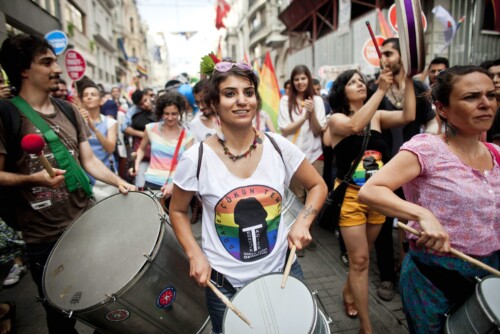III. LGBT human rights in the Face of LGBT Human Rights
The recognition that LGBT rights are human rights can be enormously powerful—and not only as a means of securing justiciable entitlements, but as a meaningful acknowledgment of citizenship and shared humanity in itself. 1 As right-wing, authoritarian parties gain power in many parts of the globe, activists face the danger that formerly sympathetic governments will reverse course on their commitments and minimize or reject LGBT rights and the tangible protections those rights have produced, or will elevate voices who have consistently opposed sexual rights at the UN and elsewhere. Without diminishing the very real benefits of institutional recognition, particularly in a political moment when rights to expression, association, assembly, and bodily autonomy have come under threat, three potential dangers merit deeper thinking as LGBT human rights calcify into LGBT Human Rights. Such thinking can inform a more critical, productive engagement that recognizes that human rights neither define nor exhaust the claims of transnational LGBT activism—perhaps especially if LGBT rights are taken up by actors who acknowledge their validity but use or coopt them in especially objectionable ways. I start with the emphases on legality, universality, and indivisibility that critics have identified within the human rights framework generally, and consider how these might pose particular problems for LGBT movements.
Perhaps the most intractable feature of human rights discourse is its inherent legality. As discussed above, this takes many forms—a primary concern with the state apparatus, and an emphasis on justiciable rights, held by individuals, as the solution to any number of potential problems.
For LGBT movements in particular, a primary danger with this model is that complex claims about sexual autonomy, identity, acts, and relationships will be confined to the legalistic, technical terms of human rights discourse, and claims that do not fit within those boundaries will be discounted. The costs of this erasure are potentially enormous. In the context of LGBT advocacy, sexual liberation, biology, epidemiology, civil rights, and religious and national traditions have offered alternative tactical frameworks for activists in domestic and transnational forums. 2
Indeed, from a historical perspective, many of the most successful demands LGBT activists have made transnationally are not solely cognizable within a traditional human rights framework. The campaign to depathologize homosexuality—among the earliest large-scale global efforts by LGBT advocates—was not dependent on human rights framings, for example, but drew more capaciously on medical and psychiatric knowledge and debates about technologies of social control. The same is true of HIV/AIDS advocacy, which productively adopted human rights framings but also sounded its demands in other registers. 3 The demand to take HIV/AIDS seriously and respond accordingly has been articulated not only in the language of law but in public health, development, and humanitarianism, with demands for rights coexisting with equally urgent demands for visibility, resource allocation, and political action.
It is tempting to see the multitude of strategies used in transnational LGBT advocacy as a less appealing substitute for the kinds of demands that could be advanced under the banner of full and equal citizenship—often, appeals to discourses of epidemiology or compassion have been deployed most forcefully when LGBT activists were outside of the halls of power looking in. But treating these kinds of strategies as historical relics would be a mistake. LGBT activists have steadfastly continued to conduct research and pursue agenda items based on urgent, deeply felt needs of queer people that are not necessarily coterminous with human rights framings.
OutRight Action International’s recent multi-year study of violence against LBT people in Asia, often at the hands of non-state actors, is a powerful example of this line of work. 4 Similar studies have, in the past, focused on issues like religious fundamentalisms in Latin America and the Caribbean or blackmail and extortion in sub-Saharan Africa—topics that, in a traditional human rights framework, may be difficult to recognize and address. 5 The topic of religious fundamentalisms is a difficult one to tackle using a traditional human rights lens, for example, because violations are often carried out at least in part by non-state actors, making traditional notions of culpability and accountability difficult. The topic of blackmail and extortion may fit uneasily within a human rights framework as well, in part because these offenses are typically considered criminal acts, and are addressed by penal codes and domestic legislation in most states. 6 Although state culpability may be evident when blackmail and extortion go unaddressed or laws prohibiting them are selectively enforced, the crimes themselves are not inherently human rights violations any more than crimes like petty theft, mail fraud, or arson. What differs is that activists understand blackmail and extortion—like so-called corrective rape—to be deeply imbued with homophobia and transphobia, used as a tool of social control, and profoundly threatening to the safety and security of queer communities. Even as LGBT human rights gain traction, OutRight has engaged in monitoring of homophobia and transphobia in Caribbean media, attempts to address the economic cost of exclusion, and safety planning trainings, in addition to more traditional forms of human rights advocacy. 7
Other urgent issues raised by LGBT activists around the globe are similarly difficult to fully address through a human rights lens. Can the human rights framework fully articulate the harm of being left out of research and data collection efforts? Or pinpoint everything that is medically or ethically wrong with so-called “conversion therapy,” a pseudo-scientific attempt to make LGBT people heterosexual or cisgender, or the pathologization of trans identities by psychiatric bodies, or normalization surgeries on intersex infants? Or meaningfully address a lack of economic opportunity or disparate outcomes in labor markets for LGBT workers? For that matter, what can human rights presently offer in the demand for partnership recognition, which has made tentative strides with some human rights bodies but has been treated skeptically by others? LGBT activists continue to recognize that these issues are patently important and demand urgent attention, even when they cannot be reduced to issues of actionable rights that individuals can assert against the state.
The emphasis on legality inherent in human rights thus has potentially significant intra-movement effects, but it is also important to note potential dangers for inter-movement solidarity. As some claims are legitimated as human rights, others are sidelined by respectability politics and fresh distinctions between deserving and undeserving rights-holders. The ascendancy of LGBT human rights has not necessarily produced new commitments to sexual rights from governments and intergovernmental bodies, and many of these claims remain dangerously precarious or even appear to be backsliding. 8
One example is reproductive rights, particularly the right to abortion. Such rights are under intense siege in both domestic and international forums, including those where LGBT rights are being enthusiastically embraced. 9 In contexts like Ireland, Malta, and much of Latin America, for example, LGBT rights have rapidly ascended while reproductive rights have stalled. Whether the appeals to autonomy, equality, and dignity that LGBT activists assert within a human rights framework have the same potency for policymakers in the context of the right to abortion remains an open and contested question.
A second example is sex work. Many of the governments that have forcefully trumpeted LGBT human rights in their foreign policy also have been among the least helpful where sex workers’ rights are concerned. Sweden made headlines for threatening to withdraw aid to Uganda during the debate over Uganda’s Anti-Homosexuality Bill, but has simultaneously promoted a model of sex work policing that has been roundly condemned by sex workers and their advocates. 10 The United States’ newfound interest in LGBT human rights under the Obama Administration, too, was not necessarily mirrored in initiatives to ensure sex workers’ rights—it took a ruling from the Supreme Court to eliminate the Anti-Prostitution Pledge gagging aid recipients from appearing to endorse or support sex work, and U.S. anti-trafficking policy continues to conflate sex work and trafficking. 11
Such disjunctures make it possible, if not probable, that many newfound proponents of LGBT human rights will embrace assimilation and respectability politics wherein some segments of the LGBT spectrum will see their rights vindicated while others—for example, queer sex workers—will not. To the extent these divisions structure funding streams, policymaking, and access to public forums, they may have meaningfully constraining effects even when many LGBT activists themselves maintain a broad and inclusive commitment to sexual rights. In addition to their effects on how rights are constructed and understood, such divisions threaten to disrupt historical alliances within sexual rights movements, offering some LGBT activists credibility and a seat at the table at the expense of solidarity with other sexually marginalized groups and mutual insistence on their rights.
A second concern is that LGBT human rights will be rigidly defined and insisted upon as they aspire to universality, and a tactical allowance for different political aims and goals that informs transnational LGBT advocacy will be sacrificed as a result. The utility of a universal framework—already suspect in the human rights literature—is perhaps especially dubious in LGBT advocacy, where a great deal depends on legal and social context. LGBT identities and claims have long been characterized as Western imports with limited resonance in other contexts, and framing acceptance of queer people as a matter of human rights—a framework that is itself understood to be culturally specific—may practically function to undermine longstanding efforts to ground acceptance of queer people in indigenous histories and traditions.
Conventional human rights approaches place a heavy emphasis on codification—literally, of course, in the development of statements, resolutions, and treaties that act as lodestars for advocacy, but also more abstractly in the fixation of issues as rights or not-rights. Given the universalist aspirations of the human rights project, it can be uncomfortable to recognize in a public way that a human right might not be practical or productive to pursue in some contexts even though it is in others. Although this has always been true to some extent, the absorption of LGBT rights into putatively international projects like the UN makes it increasingly difficult to maintain heterogeneity both as a matter of principle and as a matter of strategy. One sees this possibility in the deployment of LGBT envoys from the Global North, but also in the foreign policy of states promoting LGBT human rights abroad. Faced with pressure from constituents who see LGBT human rights as indivisible and unassailable and from activists around the globe who have their own strategic goals and priorities, it is doubtful that governments in the Global North will reliably defer to the latter.
Where the universality of LGBT human rights may have the sharpest effect is among LGBT activists themselves, who may feel pressure to take philosophically consistent positions across the board regardless of the political realities that domestic activists face on the ground. The need for ideological rigidity would do an enormous disservice to the complexity and inventiveness that has characterized a great deal of LGBT human rights campaigning. 12 Transnational LGBT activists have always recognized that, regardless of their own principles and beliefs, the efficacy of certain demands is incredibly context-dependent, and there are strategic reasons not to insist on some rights claims in some contexts.
The right to same-sex marriage is only one example. One can begin to see a demand for ideological consistency occurring in the aftermath of the U.S. Supreme Court’s ruling in Obergefell v. Hodges, which reverberated around the globe as politicians, the media, and anti-LGBT activists openly challenged LGBT activists in other countries to clarify whether they too thought access to marriage was a right. 13 Conscious of the fact that aggressive campaigning for same-sex marriage would be counterproductive and even dangerous for allies in a number of contexts, most transnational groups have celebrated relationship recognition where it has occurred but have not aggressively insisted on same-sex marriage as a human right in all contexts. 14 Even assuming that the ability to marry is a desirable right—which is itself an open question, both socially and legally, in many countries—advocates are acutely aware that, for the time being, the enactment of same-sex marriage is neither politically nor judicially feasible in many contexts globally.
Nor is relationship recognition necessarily an outlier in this regard. Decriminalization, which many people see as one of the most basic and fundamental indices of LGBT human rights protection, is not a universal political goal in every context where criminal laws remain in place. Activists in many contexts have prioritized non-discrimination laws that regulate public life rather than focusing on penal provisions that criminalize same-sex intimacy but are perhaps more difficult to enforce. 15 Whether or not decriminalization is compelled by a human rights framework is beside the point; in context, that demand can prove ineffectual or even counterproductive. 16
A related example that I have discussed elsewhere is what a human rights approach to hate crimes should entail. 17 The answer to this question is profoundly contextual, and is shaped not only by understandings of freedom of speech and legal concepts like harassment and intimidation, but also by domestic political histories, the aims and conditions of incarceration, and the rates of violence that queer people experience. What does it mean to endorse hate crimes legislation in the United States, where racist and classist policing, draconian sentencing laws, and a broken penal system converge to make hate crimes enhancements potential human rights violations in themselves? And does it mean the same thing in a context like South Africa, where grassroots groups have made an aggressive push for hate crimes legislation in the hope that there will be some accountability for infamously high rates of gender- and sexuality-based violence? In the event these contexts demand different approaches, does the use of a universalist human rights lens aid or hamper nuanced activist responses?
These are context-dependent questions in transnational LGBT advocacy, and their context-dependence is the rule, not the exception. It is possible to frame politically difficult issues like equalizing age-of-consent laws, promoting LGBT-inclusive sexuality education, or enacting same-sex marriage as matters of universal human rights, but this does not necessarily mean it is politically expedient. Many transnational LGBT activists have recognized the distinction for decades and developed acute sensitivity to context, but whether this is the case as LGBT human rights are taken up by powerful new actors remains to be seen.
A third concern is the emphasis on indivisibility that is latent in the latter half of the maxim that LGBT rights are human rights, and human rights are LGBT rights. The larger human rights framework encompasses a number of rights advanced by a number of movements, and many of the rights endorsed by domestic and transnational bodies are not necessarily claims LGBT activists would or even should publicly support. In a system that emphasizes the indivisibility of rights, activists who treat inroads at the UN as authoritative vindication not only legitimate LGBT rights, but implicitly legitimate a whole range of rights being constantly codified and promoted, to say nothing of the highly eclectic, undemocratic apparatus of global governance through which those processes take place. Ceding authority to intergovernmental bodies to define what is and is not a right, or treating their pronouncements as definitive, may at times be regrettable for LGBT activists with a broad commitment to social justice. The UN is warming to LGBT rights, but it also functions to authorize and legitimate military action around the world, facilitate property rights and global capitalism, and permit governments to carve out compromises and exceptions to their human rights commitments.
One could point to various developments at the UN and elsewhere that LGBT activists might find objectionable—for example, the recognition of the importance of “traditional” values by the UN Human Rights Council. 18 But even in the absence of overt disagreement, there may be pitfalls in committing to a human rights framework where LGBT rights must coexist with other political claims. Consider, for example, how LGBT rights have been traded as a bargaining chip in negotiations over human rights guarantees. 19 And when LGBT rights are recognized by intergovernmental bodies, tensions among different rights are inevitable and relatively undertheorized by scholars of LGBT advocacy. What does it mean to claim a right for queer people to assemble or speak in a human rights framework that also permits that right to be limited when sexual speech might be heard by children? What does it mean to celebrate resolutions affirming LGBT rights as authoritative guidance when they are quickly followed by resolutions affirming traditional values in the human rights context? And for the purposes of the larger question at hand, does entry into the human rights framework alleviate these concerns by giving activists a seat at the table, or does it wed LGBT activists to a framework that regards their rights as a subset among many? More realistically, if it means both of these things at once, what approaches allow LGBT activists to insist upon the legitimacy of hard-won human rights while simultaneously maintaining distance from reactionary developments in the field itself? None of these questions have easy answers, but they collectively underscore the difficult truth that legitimizing LGBT rights as human rights in particular forums often means legitimizing the forums and their other actions as well.
IV. Conclusion
The transition from LGBT human rights to LGBT Human Rights raises concerns, but these concerns are not inherently fatal to a progressive and critical LGBT human rights project. The strength of the LGBT human rights movement is, and arguably always has been, the expansiveness of its claims for recognition, access, equality, and dignity; its willingness to look beyond the state and its laws to the violations that are most acutely felt by queer people themselves; and the boldly transformative solutions that it proposes to create a world where people are freer to act, identify, and relate to one another.
A danger at the present moment is the myopia of the truism that LGBT rights are human rights and human rights are LGBT rights. The difficult task at hand is to insist that this phrase, even if it rings true, does not exhaust the horizon of transnational LGBT advocacy—that LGBT issues are not always human rights, and that human rights do not define what a truly transformative LGBT agenda demands. Other movements have understood the importance of that critical distinction—consider, for example, the space for other approaches and demands in the frameworks of “reproductive health and rights” and “racial justice,” which structure movements to be attentive to rights but also look beyond them. Whether similar space is preserved as LGBT human rights are taken up as Human Rights remains to be seen.
- Makau Mutua, “Sexual Orientation and Human Rights: Putting Homophobia on Trial,” in African Sexualities: A Reader, ed. Sylvia Tamale (Oxford: Pambazuka Press, 2011), 452.[↑]
- For a wide-ranging description of the many facets of sexuality, see Stella Nyanzi, “From Miniscule Biomedical Models to Sexuality’s Depths,” in African Sexualities: A Reader, ed. Sylvia Tamale (Oxford: Pambazuka Press, 2011), 48.[↑]
- Dennis Altman, Global Sex (Chicago: University of Chicago Press, 2001), 68-85, 122-37.[↑]
- OutRight Action International was formerly known as the International Gay and Lesbian Human Rights Commission (IGLHRC). See IGLHRC, Violence: Through the Lens of Lesbians, Bisexual Women and Trans People in Asia (New York: IGLHRC, 2014).[↑]
- Thoreson, Transnational LGBT Activism, 112-13.[↑]
- Ryan Thoreson & Sam Cook eds., Nowhere to Turn: Blackmail and Extortion of LGBT People in Sub-Saharan Africa (New York: IGLHRC, 2011).[↑]
- Jessica Stern, “Protecting Lives,” email to OutRight supporters, Jan. 15, 2016; Suzanne Trimel, “United Nations Enlists OutRight in Effort to Measure LGBTI Inclusion Worldwide,” https://www.outrightinternational.org/content/united-nations-enlists-outright-effort-measure-lgbti-inclusion-worldwide; IGLHRC & United and Strong, Homophobia and Transphobia in Caribbean Media: A Baseline Study from Belize, Grenada, Guyana, Jamaica and Saint Lucia (2015); IGLHRC & United and Strong, Media Training Manual: A Guide for Media in Belize, Grenada, Guyana, Jamaica and Saint Lucia (2015).[↑]
- The Coalition of African Lesbians expressed thoughtful concern on this point when they publicly opposed the creation of a Special Rapporteur on Sexual Orientation and Gender Identity, arguing instead for a Special Rapporteur on Sexuality and Gender with a broader mandate to work on a wider range of sexual rights issues. Coalition of African Lesbians, “Coalition of African Lesbians Says NO to a Special Rapporteur on Sexual Orientation and Gender Identity,” Sexuality Policy Watch, May 30, 2016, http://sxpolitics.org/activists-brief-coalition-of-african-lesbians-says-no-to-a-special-rapporteur-on-sexual-orientation-gender-identity/14809.[↑]
- On the uneven pace of LGBT and reproductive rights claims at the UN, see Alice M. Miller & Mindy J. Roseman, “Sexual and Reproductive Rights at the United Nations: Frustration or Fulfilment?,” Reproductive Health Matters 19.38 (2011): 1-17. [↑]
- Sebastian Kohn, “Why Amnesty International Must Hold Firm in Its Support for Sex Workers,” Open Society Foundations, July 28, 2015, https://www.opensocietyfoundations.org/voices/why-amnesty-international-must-hold-firm-its-support-sex-workers.[↑]
- Agency for International Development v. Alliance for Open Society International, Inc., 133 S. Ct. 2321 (2013). [↑]
- As Sibongile Ndashe has noted, “A growing and cautious movement is increasingly being requested to be more assertive and aggressive in claiming rights. Those who argue otherwise are accused of being content with the status quo or simple cowardice. It is part of the single story to propose a single solution for ‘Africa’ regardless of the levels of preparedness within countries to undertake action and in denial of the specific contexts of individual countries.” Sibongile Ndashe, “The Single Story of ‘African Homophobia’ is Dangerous for LGBTI Activism,” in Queer African Reader, ed. Sokari Ekine & Hakima Abbas (Oxford: Pambazuka Press, 2013): 159.[↑]
- In some sense, the spillover effects of rights in any one domestic context are impossible to avoid in a globalized world. Uganda passed its constitutional amendment banning same-sex marriage when only the Netherlands, Belgium, Spain, and a single U.S. state had enacted same-sex marriage. Whether or not activists in a country are actively agitating for political goals like same-sex marriage, the specter of those goals offers a foil for opponents of LGBT rights who seek to shore up popularity—and recognizing marriage as a universal human right is likely to amplify this anxiety.[↑]
- See, for example, the Yogyakarta Principles, which do not explicitly assert a right to same-sex marriage; Ndashe, “The Single Story of ‘African Homophobia,’” 161-62.[↑]
- Activists in Pakistan, Bangladesh, and Trinidad and Tobago have all voiced skepticism about the tactical wisdom of pursuing decriminalization in those contexts. See Sumit Baudh, “Decriminalization of Consensual Same-Sex Sexual Acts in the South Asian Commonwealth: Struggles in Contexts,” in Human Rights, Sexual Orientation and Gender Identity in the Commonwealth: Struggles for Decriminalisation and Change, ed. Corinne Lennox & Matthew Waites (London: Institute of Commonwealth Studies 2013), 299-301; Joseph Gaskins Jr., “‘Buggery’ and the Commonwealth Caribbean: A Comparative Examination of the Bahamas, Jamaica, and Trinidad and Tobago,” in Human Rights, Sexual Orientation and Gender Identity in the Commonwealth: Struggles for Decriminalisation and Change, ed. Corinne Lennox & Matthew Waites (London: Institute of Commonwealth Studies 2013), 446. [↑]
- When political will does not exist for criminalization, reform has at times expanded criminalization to women as well as men, for example, in Botswana and Malawi. See Monica Tabengwa & Nancy Nicol, “The Development of Sexual Rights and the LGBT Movement in Botswana,” in Human Rights, Sexual Orientation and Gender Identity in the Commonwealth: Struggles for Decriminalisation and Change, ed. Corinne Lennox & Matthew Waites (London: Institute of Commonwealth Studies 2013), 341-42; Undule Mwakasungula, “The LGBT Situation in Malawi: An Activist Perspective,” in Human Rights, Sexual Orientation and Gender Identity in the Commonwealth: Struggles for Decriminalisation and Change, ed. Corinne Lennox & Matthew Waites (London: Institute of Commonwealth Studies 2013), 361-62.[↑]
- Thoreson, Transnational LGBT Activism, 1-4.[↑]
- See Matthew Schaaf, “LGBTI People Caught in UN Clash Between Universal Rights and ‘Traditional’ Values,” Freedom House, July 8, 2014, https://freedomhouse.org/blog/lgbti-people-caught-in-un-clash-between-universal-rights-and-traditional-values#.VcfXdDBViko.[↑]
- Negotiations over the 1995 Beijing Platform for Action are among many examples of this type of bargaining. See Francoise Girard, “Negotiating Sexual Rights and Sexual Orientation at the UN,” in SexPolitics: Reports from the Frontlines, ed. Richard Parker, Rosalind Petchesky, and Robert Sember (Sexuality Policy Watch 2007), 311-58.[↑]



